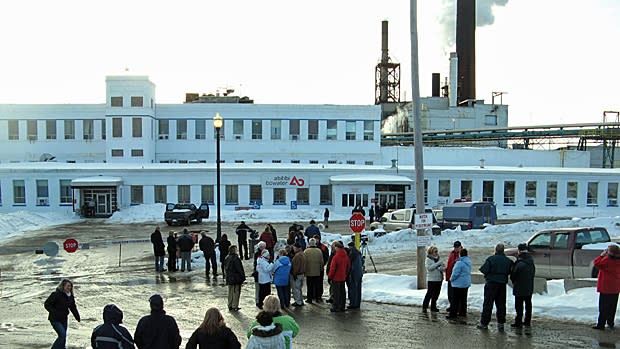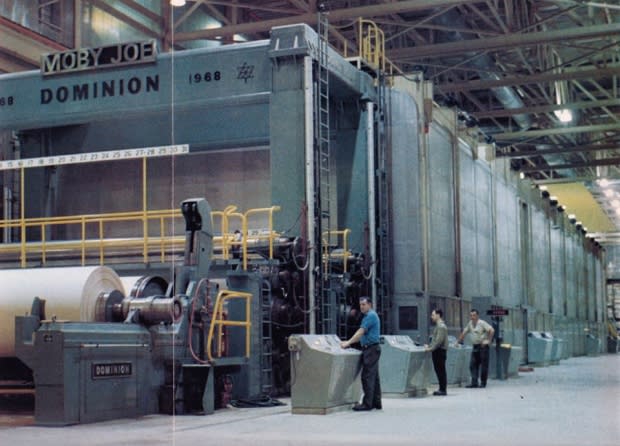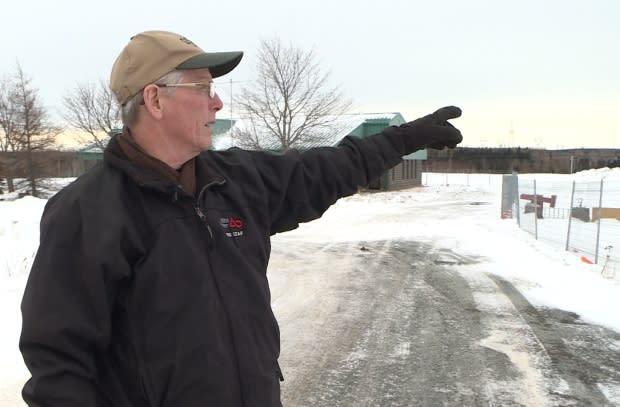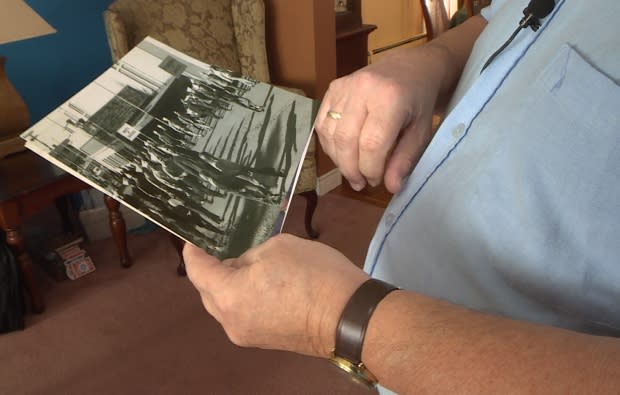A decade on, workers — and town — still mourn loss of Grand Falls-Windsor mill
If you strain hard enough — and it helps if you have 30 years of experience — you just might recall the regimented sounds that defined life in Grand Falls-Windsor for decades.
At 8 a.m., and again at 4 p.m, the whistle of the Grand Falls-Windsor pulp and paper mill blew to mark shift changes. And, even if you didn't work in the mill, the whistle was so loud, for many, it defined the beginning and the end of your work day.
"If you were outside playing, and you heard the whistle, you knew it was pretty close to suppertime so you had to get home," said Junior Downey.
"I couldn't tell time when it was five or six, but I knew the whistle."
He'd come to know that whistle so much better in later life.
Downey spent 36 years working inside the mill, finishing on the day the plant shut down — and the whistle sounded that last time.
"To some it was emotional, but to some, they just didn't think it was going to happen. Like, I didn't see anyone crying."

'Ghostly quiet'
Today, a decade later, there's no whistle, no smokestack, hardly a reminder left on the property that an economic powerhouse stood there for a century.
"There's an absence... there's something gone out of your community. And it will never be replaced," said Ron Smith.
Smith was a mill worker, a union organizer, and now volunteers with the Grand Falls-Windsor Heritage Society.
"Even today, I still miss the sound. I'm used to the sounds, and they're not there. I was in the mill after it was down and it was like walking into a mausoleum or a grave or something, it was cold and ghostly quiet."

Smith left the factory floor in the late 1980s, to become a full-time union organizer with the Canadian Paperworkers Union — it would later change its name to the Communications, Energy and Paperworkers Union of Canada (CEP) and is now a big part of Unifor, Canada's largest private sector union.
Smith was amazed, during his first union drives for paperworkers and loggers, to see how big of a reach the Grand Falls-Windsor mill had.
In the town of Seal Cove, Fortune Bay — almost 3 hours away from the mill — Smith counted 74 people who were employed by the mill, in a town of about 450.
A working class life
Life at the mill was a working class affair — it wasn't a parent's first choice, said Downey, and if your family could send you to university or college they would.
But through the noise and the heat and the steam, it provided a solid living, and a solid foundation for your children.
"If you take a 100-year period, and count up the number of children whose parents could afford to send them to secondary education because of that mill, you're talking about thousands of kids that became doctors and lawyers and policemen and school teachers."

Smith was a union representative in December 2008, when AbitbiBowater announced the Grand Falls-Windsor mill would shut down. He said with a fall in newsprint demand, it wasn't an question of if the company would close mills, but which ones were candidates — and Grand Falls-Windsor, being so remote, was a prime target.
The mill had an annual payroll of $48 million at that time, according to Smith, and that "disappeared one morning."
But its closure never quite prompted the economic disaster some people feared.

"The average age in the mill at the time was 55 years of age. So most people were ready to move off into a pension," said Smith.
"So they had their homes paid for, for the most part, families raised. So they continued purchasing in the marketplace the same as they always did."
In Downey's case, his wife was working, and that meant some financial stability. He was 55 when the mill closed, and was able to take a reduced pension, and stay in the community.
We've got a one-horse town and the horse is gone. - Ron Smith
But that doesn't mean nothing changed.
Downey says people don't work in large factories anymore, especially not in Grand Falls-Windsor, and there's a social element that's disappeared.
"Everybody worked together, you were one big family there, you know? You come together, you passed your buddy coming out, your buddy coming in, you spoke about a few things for a few minutes. You knew everybody when you see them."
Smith echoes the sentiment.

"Today, I mean, I love Grand Falls, but I don't know most of the people that work and live here anymore. One time I could tell you who lived in every house in Grand Falls, I can't do that anymore," he said.
"We've got a one-horse town and the horse is gone."
Story not finished
This month, the Grand Falls-Windsor Heritage Society took the keys to the old training centre, the one building left standing near the old mill site.
Grand Falls-Windsor Mayor Barry Manuel says council imagines a future for the surrounding, empty property, once they get control of it from the provincial government.
"Take down the chain link fence, we don't want it to look like a wasteland like it has for the last 10 years, and whatever the parameters of development will be, we want to look at what's in the best interest of the community."
The mayor said it's prime real estate, next to a scheduled salmon river, and close to the Salmonoid Interpretation Centre.
A spokesperson for the province said last month it was working with the council to transfer the land — something Manuel hopes to have finished this year.
"With the heritage society now on site with their new home, and they'll have all our history on display of the former community and communities, and of the mill itself.
"So I think it's an opportunity to celebrate our history, but for us we just want to move forward."

